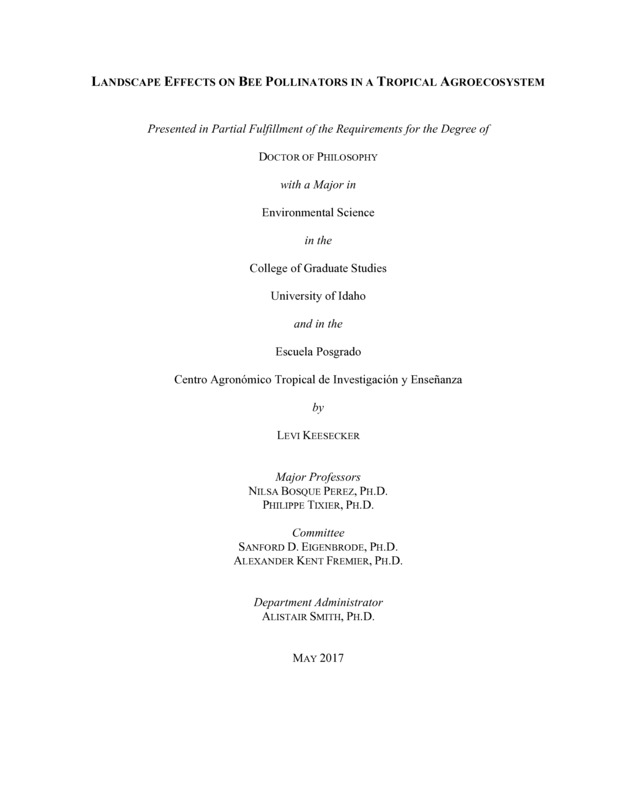LANDSCAPE EFFECTS ON BEE POLLINATORS IN A TROPICAL AGROECOSYSTEM
Keesecker, Levi. (2017). LANDSCAPE EFFECTS ON BEE POLLINATORS IN A TROPICAL AGROECOSYSTEM. Theses and Dissertations Collection, University of Idaho Library Digital Collections. https://www.lib.uidaho.edu/digital/etd/items/keesecker_idaho_0089e_11057.html
- Title:
- LANDSCAPE EFFECTS ON BEE POLLINATORS IN A TROPICAL AGROECOSYSTEM
- Author:
- Keesecker, Levi
- Date:
- 2017
- Embargo Remove Date:
- 2019-06-12
- Keywords:
- bees coffee community ecology conservation functional diversity landscape ecology
- Program:
- Environmental Science
- Subject Category:
- Ecology
- Abstract:
-
Land-use change and intensification are among the most important drivers of species loss and the degradation of ecosystem functions. Agricultural areas occupy nearly 40% of the Earth’s surface, thus efforts to mitigate the ecological effects of land-use intensification should focus in part on utilizing more sustainable food production practices that enhance species persistence within farms.
Bees (superfamily Apoidea) are widely considered the most important pollinators globally for both wild plant pollination and agricultural production. Global declines of managed and wild bees threaten the delivery of pollination services to agriculture.
In my first two chapters, I present results of research conducted in a coffee-dominated agricultural landscape in Costa Rica. I explore the extent to which coffee farm intensity (e.g., “sun” coffee vs. “shade” coffee) affects bee community dynamics. Chapter 1 focuses on how land-use intensity mediates the distribution and relative abundance of bee functional traits that are thought to be important for pollination. Chapter 2 explores how land-use context within an agroecosystem affects bee diversity and stability at the community scale. Both functional diversity, and diversity-stability relationships are community patterns that have been demonstrated to have a mechanistic relationship to ecosystem functioning (e.g., pollination).
We found that landscape context does influence functional trait distributions and relative abundance in bee communities in a coffee agroecosystem, implying that landscape context moderates the trait composition of bee communities. Further, we found that the traits that responded to landscape elements are traits considered important for delivery of pollination services within farms. We also elucidate how landscape-scale intensification of coffee agroforestry practices reduces community-scale stability of bees by synchronizing their populations through time.
My third chapter is framed within the heuristic of “Social-Ecological Systems” as part of the University of Idaho’s Integrative Graduate Education and Research Traineeship (IGERT) program. Here my co-authors and I show that natural resource management challenges may be aided by embarking on a thorough exploration of the spatio-temporal scales at which biophysical processes and natural resource governance operate, with an emphasis on spatio-temporal scale “mis-fit” (i.e., when biophysical processes that provision a resource are managed at improper scales).
- Description:
- doctoral, Ph.D., Environmental Science -- University of Idaho - College of Graduate Studies, 2017
- Major Professor:
- Bosque Perez, Nilsa; Tixier, Philippe
- Committee:
- Fremier, Alexander K; Eigenbrode, Sanford D
- Defense Date:
- 2017
- Identifier:
- Keesecker_idaho_0089E_11057
- Type:
- Text
- Format Original:
- Format:
- application/pdf
- Rights:
- In Copyright - Educational Use Permitted. For more information, please contact University of Idaho Library Special Collections and Archives Department at libspec@uidaho.edu.
- Standardized Rights:
- http://rightsstatements.org/vocab/InC-EDU/1.0/

